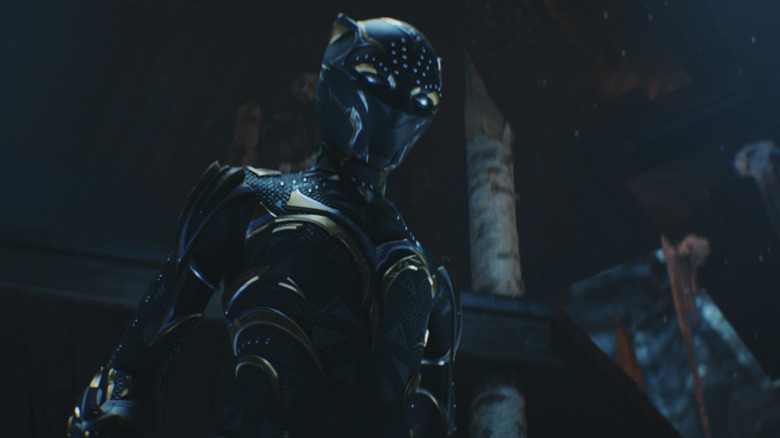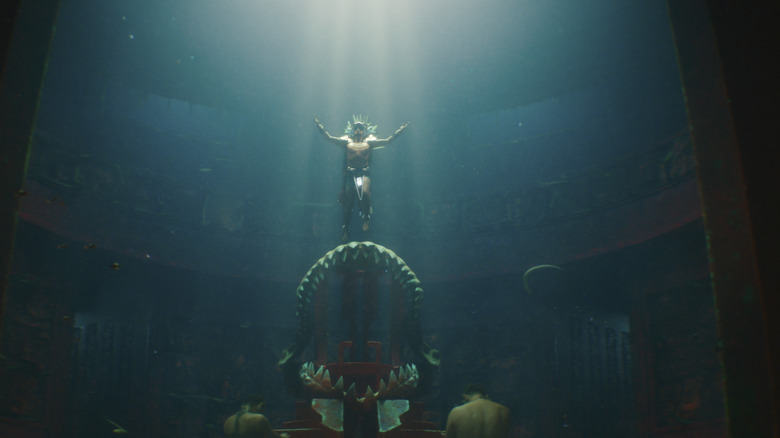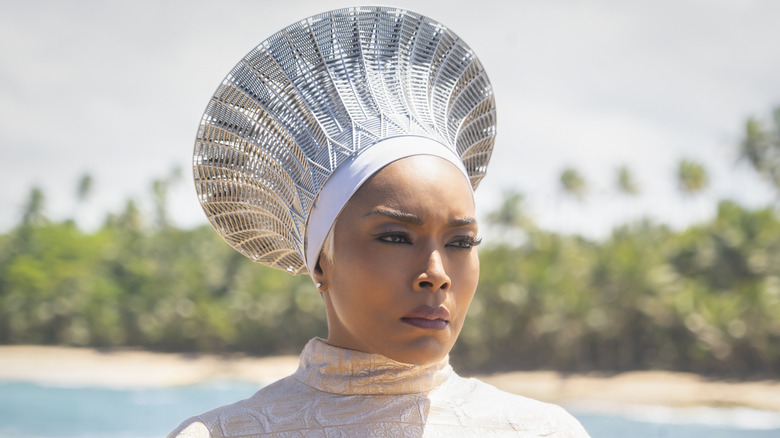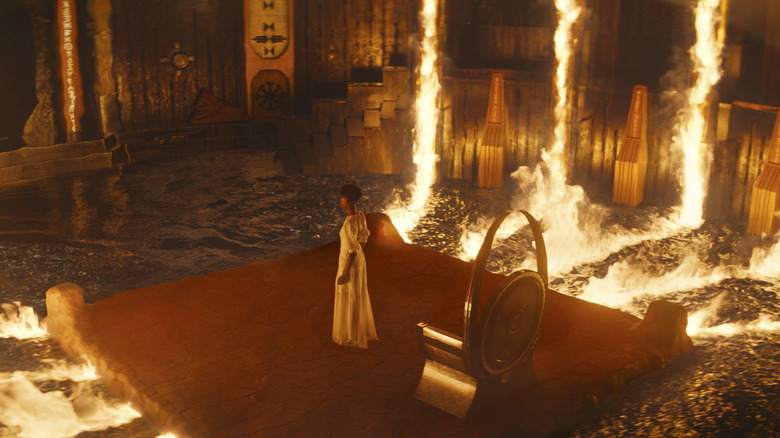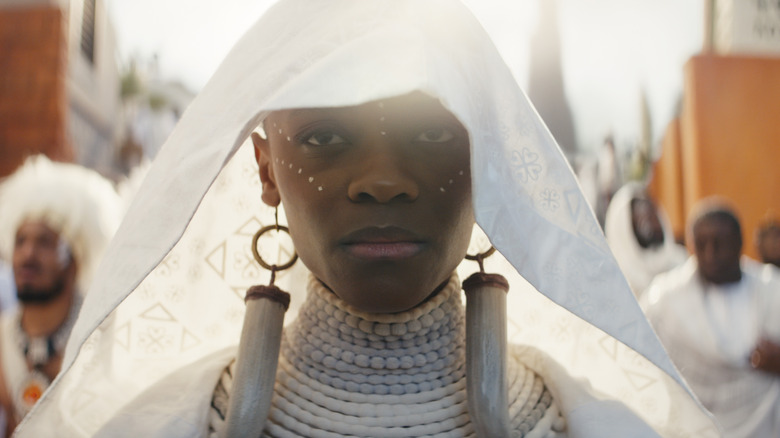Black Panther: Wakanda Forever Ending Explained: All Things Must Pass
Life is a contradiction, a series of meetings and partings (as Dickens once put it) that both find conclusions and simultaneously never ends. For that reason, one of the functions of storytelling is to serve as a salve for humanity's endless struggle with time; unlike existence, stories can find resolution, allowing for understanding and acceptance to be more easily reached.
The Marvel Cinematic Universe franchise experiment that's been running for the past decade and change boldly presented a kind of resolution in the form of 2019's "Avengers: Endgame," a movie that felt properly climactic. Yet the stories of so many characters that feature in it were never intended to end there, and as the MCU has moved into its fourth "phase" comprised of both feature films and TV shows, the onscreen Marvel world has struggled with finding a new path forward. Yes, new characters such as Shang-Chi and the Eternals have been introduced, and legacy characters like Thor have continued. Still, there's been a distinct sense that the MCU is now rudderless, having no obvious momentum like the Avengers Initiative and no Thanos out there collecting powerful stones and the like.
The makers of 2018's hit "Black Panther" found themselves in twice the predicament when the time came for them to develop a sequel to that film. Not only was the direction for the characters wide open, but star Chadwick Boseman tragically passed away in 2020 well before filming for the sequel had begun.
While many franchise sequels have recast major characters with new actors when the prior one can't or won't return, director and co-writer Ryan Coogler's choice to have "Black Panther: Wakanda Forever" face real life head-on is one of the boldest moves in the MCU and in franchise filmmaking to date. It makes "Wakanda Forever" a personal and deeply felt movie about loss and grief in all its forms, one that seeks not to provide an easy conclusion but instead looks to continue the awareness, discussions, and emotions established by the first film.
A tale of two cities
After a harrowing opening sequence that sees Shuri (Letitia Wright) unable to stop the unnamed fatal illness which leads to her brother T'Challa's death, "Wakanda Forever" leaps forward a year, establishing that Queen Ramonda (Angela Bassett) is now the ruler of Wakanda, and the other nations of the world have been very envious of Wakanda's Vibranium deposits, with some even going to aggressive lengths to procure the wonder element for themselves.
Coming as much of a surprise to the Wakandans as to the rest of the world, Vibranium has been found elsewhere — miles beneath the sea, in fact. This doesn't mean it's unclaimed, however, as the precious material is the property of the kingdom of Talokan, ruled by Namor (Tenoch Huerta Mejía), a leader who is not only arrogant and quick to violence but has some formidable mutant superpowers to boot.
Namor has ample cause to be on the offensive, however, as he is descended from the native Mesoamerican peoples, cultures that were displaced, abused, and/or enslaved by European colonizers. Seeing the possibility for an alliance with Wakanda, Namor at first makes an offer to Queen Ramonda and invites (make that kidnaps) Shuri to visit Talokan to demonstrate the beauty, culture, and promise of his people.
Yet Namor also knows that Wakanda is wounded from T'Challa's loss, just as the United States and other world powers perceive Wakanda as lacking their major protector in the form of the Black Panther. In this way, Wakanda is made out to be a prodigious and prosperous target, a "have" to Talokan's "have-not." Its interest in maintaining peace with the rest of the world is a direct threat to Namor's plan of annihilation, as he intends to rid the world of all but his countrypeople.
Haunted by grief
The lack of a Black Panther is only the tip of the emotional iceberg for the leaders of Wakanda. Queen Ramonda is a mother who's lost her son, Shuri is a sister who's lost her brother, Okoye (Danai Gurira) is a soldier who's lost her general, and Nakia (Letitia Wright) is a woman who's lost her true love. Every woman is dealing with their grief and loss in their own way, and none of them have chosen the healthiest of options. Even though Queen Ramonda burns her robes from T'Challa's funeral, believing his spirit is now with the ancestors, she then turns part fire and brimstone monarch, part mama lion (er, make that panther), being overly protective of Shuri while lashing out at those around her, whether they be sovereign nations overstepping their bounds or poor Okoye, whose unfortunate luck while she and Shuri attempted to rescue the teen genius Riri Williams (Dominique Thorne) from the Talokan sees her stripped of her rank as a Dora Milaje.
Nakia has seemingly gone into hiding, leaving Wakanda entirely and establishing herself as a schoolteacher in Haiti. Although her altruism is likely partially based on some moral atoning for the things she did undercover while in service of her country, it also appears that she's acting cowardly when it comes to facing her loss, cutting off her country as well as her Queen and other colleagues.
Shuri, meanwhile, is deep in denial, retreating in her own way. Haunted by the fact that she could not manufacture a version of the Heart-Shaped Herb (the real ones having been destroyed by Killmonger in "Black Panther") in order to save her brother in time, she attempts to find solace in her science, and can't seem to find the happy-go-lucky girl she once used to be. Her lack of belief in the ancestral plane disturbs her mother, as does her refusal to burn her funeral robes, a clear sign Shuri refuses to move on from T'Challa's death.
Hurt people hurt people
The simmering tensions between Wakanda and Talokan come to a head, with Namor launching an attack on Wakanda after Queen Ramonda refuses to submit to Namor's demands that Wakanda join him in taking over the world. During the battle, Namor drowns the Queen and nearly kills Shuri in the process. His actions, intended by him as a warning, only further push Shuri into vengeful rage, her loss now doubled.
Finally perfecting a synthetic Heart-Shaped Herb, Shuri takes the potion made from it and is sent to the ancestral plane, as per the Black Panther ritual. Upon her arrival, she meets not T'Challa nor her mother but Erik Killmonger (Michael B. Jordan), who smugly yet astutely explains to Shuri how the two of them are more aligned in their beliefs than she's willing to admit. Shaken by the meeting but still out for revenge, Shuri gains the powers and mantle of the Black Panther, appearing before a new Wakandan council that sees M'Baku (Winston Duke) assuming a bigger role. The Black Panther enlists the help of Riri (now in an exosuit of her own design) and Okoye (now in a suit Shuri designed, one that references the Midnight Angels of the comics).
The Wakandans lay a trap for the Talokan, forcing their warriors to attack while the Black Panther lures the powerful Namor away from the heart of the battle into an atmosphere that drains his power. During their fight, Shuri nearly murders Namor, and it is through remembering her mother's wisdom, her brother's nobility and her own moral fortitude that she's able to stop herself. "Only the most broken people can be great leaders," something Namor said to her earlier in a moment of boasting, becomes a bellwether for her as she realizes that her pain and Namor's pain is only leading to more death and destruction, not justice or revenge.
Life takes away, life gives back
With Wakanda temporarily victorious, Namor and Talokan agree to a truce with Wakanda. The future of both countries is uncertain: Namor believes Wakanda will need their help someday and may use that opportunity to revisit their feud, while Wakanda's monarchical structure is in question, and its place among the world's nations is still up in the air, with people like Valentina Allegra de Fontaine (Julia Louis-Dreyfus) aware of CIA Agent Everett Ross (Martin Freeman) and his partnership with the country.
Ryan Coogler and co-writer Joe Robert Cole pay lip service to the film's connection to the larger MCU, but the majority of "Wakanda Forever" is a direct sequel to the first "Black Panther." Its themes of deep-seated injustice, moral obligation, and promise of progress are all further developed in this movie. Added to them is the feeling of grief and loss, something felt by the filmmakers as well as the characters, and that theme reaches its apotheosis in the final scenes.
Shuri travels to Haiti to visit Nakia for assistance with saying a final goodbye to T'Challa. Sitting on the beach near Nakia's home, Shuri finally burns her funeral robes, her experiences as the Black Panther having taught her that her brother's spirit is out there somewhere, and that great leaders must heal themselves and move on. Almost as if in answer to her spiritual and moral growth, Nakia reveals that what she was really doing in Haiti was taking care of her son, the child she and T'Challa had in secret. Shuri is introduced to the boy, who explains that he has been taught about his father, and that his name is T'Challa, as well.
The ending is the final statement of the film's theme of motherhood, something Coogler and his collaborators fully intended. As Coogler explains in an official press kit:
"The first film has a lot of father-son dynamics [...] This film very much became a story with motherhood as a motif. So often moms have to continue to mother through difficult situations."
From Namor's mother ensuring his birth to Queen Ramonda protecting Shuri to Nakia protecting baby T'Challa to Shuri protecting the Wakandan people, motherhood is fraught with sacrifice and conflict but it's all in the service of preserving life. Life is a series of meetings and partings, and one thing is certain: it must, somehow, continue. The King is dead, the Queen is dead — long live the (potential) future Queen and King.
